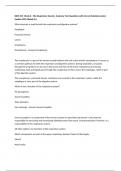Exam (elaborations)
BIOS 255- Week 6 - The Respiratory System- Anatomy Test Questions with Correct Solutions Latest Update 2025 (Rated A+)
- Course
- Institution
BIOS 255- Week 6 - The Respiratory System- Anatomy Test Questions with Correct Solutions Latest Update 2025 (Rated A+) What structure is used by both the respiratory and digestive systems? Esophagus Paranasal sinuses Larynx Oropharynx Nasopharynx - Answers Oropharynx The oropharynx is a pa...
[Show more]



